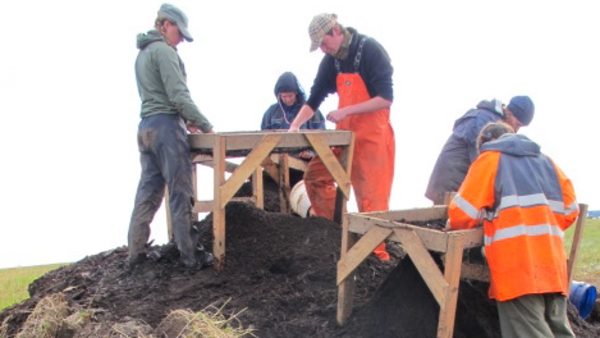Introduction
This one year Master’s programme provides students from a range of academic backgrounds with a broad-based postgraduate qualification in Archaeology, but with the option of pursuing specific archaeological specialisms, including Viking archaeology, museum studies, cultural heritage management, or biomolecular archaeology.
This course has a September 2024 start date. Apply Now.
Eligible self-funded international Masters students will receive the Aberdeen Global Scholarship. Visit our Funding Database to find out more.
This MSc in Archaeology provides an ‘umbrella’ programme to appeal to archaeology students from a range of backgrounds interested in pursuing specific archaeological subjects under the banner of a broad degree designation.
Teaching is research-led and ties into current projects run by the staff at the department, who are prominent researchers and fieldworkers in Northern Europe, Scandinavia, Northeast Asia, the North Atlantic and the circumpolar region from Siberia to the Canadian Arctic.
You will learn about theory and method in archaeological research. The flexibility of our offering means you can choose courses based on your interests, such as Northern Worlds or Viking Archaeology. You can also learn key Geographical Information System (GIS) tools and techniques used in archaeology, and develop practical skills in cartography and geo-visualisation.
The University’s extensive museum collections also present unique opportunities to explore contemporary issues around the preservation and communication of archaeological finds, particularly in relation to osteoarchaeology.
This programme can be taken as preparation for higher research, as a professional qualification, or purely out of interest. This programme is also appropriate as a conversion course for students new to archaeology but with a background in a cognate discipline.
Entry Requirements
Qualifications
The information below is provided as a guide only and does not guarantee entry to the University of Aberdeen.
2:1 (upper second class) UK Honours degree, or an Honours degree from a non-UK institution which is judged by the University to be of equivalent worth in Archaeology or a related discipline.
2:2 in Archaeology or related discipline plus related professional experience.
Please enter your country to view country-specific entry requirements.
English Language Requirements
To study for a Postgraduate Taught degree at the University of Aberdeen it is essential that you can speak, understand, read, and write English fluently. The minimum requirements for this degree are as follows:
IELTS Academic:
OVERALL - 6.5 with: Listening - 5.5; Reading - 5.5; Speaking - 5.5; Writing - 6.0
TOEFL iBT:
OVERALL - 90 with: Listening - 17; Reading - 18; Speaking - 20; Writing - 21
PTE Academic:
OVERALL - 62 with: Listening - 59; Reading - 59; Speaking - 59; Writing - 59
Cambridge English B2 First, C1 Advanced, C2 Proficiency:
OVERALL - 176 with: Listening - 162; Reading - 162; Speaking - 162; Writing - 169
Read more about specific English Language requirements here.
Document Requirements
You will be required to supply the following documentation with your application as proof you meet the entry requirements of this degree programme. If you have not yet completed your current programme of study, then you can still apply and you can provide your Degree Certificate at a later date.
-
CV
-
an up-to-date CV/Resumé
-
Degree Certificate
-
a degree certificate showing your qualifications
-
Degree Transcript
-
a full transcript showing all the subjects you studied and the marks you have achieved in your degree(s) (original & official English translation)
-
Personal Statement
-
a detailed personal statement explaining your motivation for this particular programme
Careers
An Archaeology degree can be the gateway to many other professions, and the training in analytical and communication skills acquired by our graduates make them employable in a wide variety of fields including industry, commerce and research.
The broad-based nature of the discipline enables graduates to compete strongly in the employment market place. Today Archaeologists in the UK work in an increasingly wide range of professions. A significant percentage of graduates are employed in private or university-based archaeological units and consultancies. These professionals are responsible for mitigating the impact to archaeological sites in relation to different forms of development. Typically, such posts involve a good deal of fieldwork and the production of high quality scientific reports.
Others graduates go on to research, teaching and curatorial posts in universities, museums and private institutions and work in a range of areas from interpreting ancient environments to communicating archaeology to the public. In addition to more traditional occupations, a growing number of Archaeologists are now employed by a range of governmental and non-governmental heritage organizations.
Careers in this area are primarily involved in making decisions about the management and conservation of archaeological resources at local, national and international levels. Archaeologists and individuals with archaeological training also work in a growing number of non-traditional careers where archaeological knowledge is central. These positions range widely, from jobs with engineering firms, where knowledge of archaeological principals can be crucial to project planning, to careers which engage the public's appreciation of the past.

